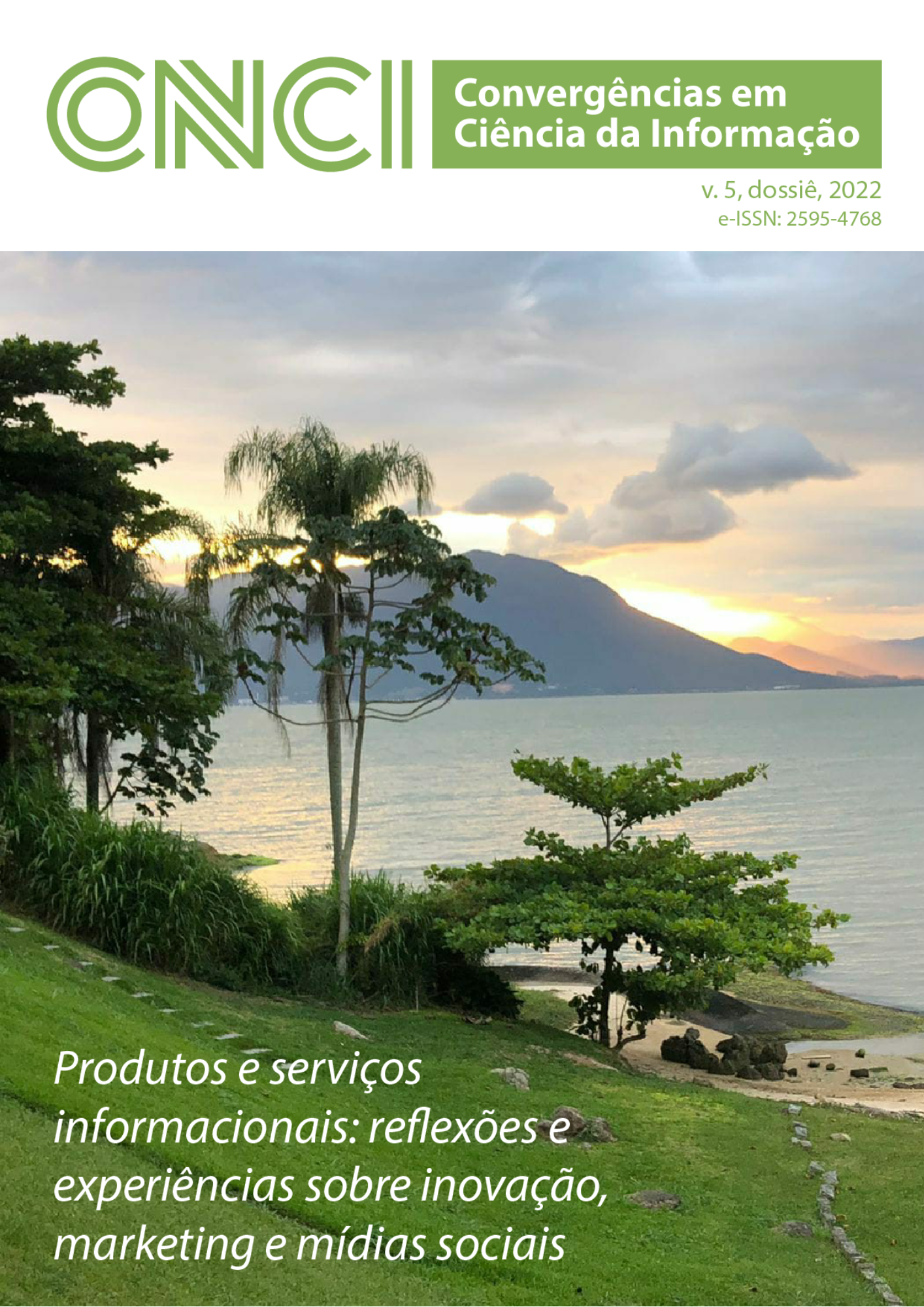Digital scientific marketing actions of journals linked to graduate programs in Information Science, and in Information Management, in Brazil
DOI:
https://doi.org/10.33467/conci.v5i.16881Keywords:
Digital marketing. Scientific journal. Scientific marketing. Scholarly communication. Social media.Abstract
The publication of articles in scientific journals enables the rise of scientists and dissemination of knowledge produced in the academic environment. This knowledge goes beyond the boundaries of teaching and research institutions by being shared on online platforms. The research aims to analyze the digital scientific marketing actions of scientific journals linked to graduate programs in Information Science and/or Information Management, from Brazilian federal universities, with programs in operation and listed on the Sucupira Platform. In the study, there is an exploratory, descriptive, and documentary core, with qualitative and quantitative approaches. The data collect includes seven magazines and their marketing initiatives actively obtained on the websites of the journals, and on their profiles on the following scientific dissemination platforms: YouTube channel, podcast show, and personal or commercial profile on Twitter, Instagram, and Facebook. It reports that journals concentrate almost 80% of marketing actions on a single platform, which there is less than 10% of the audience of the journals; and they don't produce content for audience-growing platforms such as a podcast show. It concludes that the marketing actions of journals lack development regarding the frequency of publications; presence in the main social media and scientific dissemination platforms; and the form and content of publications. These deficiencies can be remedied through the creation and application of a marketing plan suited to the needs of each journal.
Downloads
References
ARAÚJO, R. F. Marketing científico digital e métricas alternativas para periódicos: da visibilidade ao engajamento. Perspectivas em Ciência da Informação, Belo Horizonte, v. 20, n. 3, p. 67-84, 2015. Disponível em: https://www.scielo.br/j/pci/a/HNvPmkhhgkm6Snghmn6Xmkq. Acesso em: 24 nov. 2021.
ASSOCIAÇÃO BRASILEIRA DE PODCASTERS (ABPOD). PodPesquisa: 2020-2021: produtores. ABPod: [s.l.], 2021. Disponível em: https://abpod.org/podpesquisa/. Acesso em: 24 nov. 2021
BIZZOCCHI, A. Marketing científico: o papel do marketing na difusão da ciência. In: CONGRESSO BRASILEIRO DE CIÊNCIAS DA COMUNICAÇÃO, 25., Salvador, 2002. Anais [...] Salvador: SBEIC, 2002, v. NP9. Disponível em: http://www.portcom.intercom.org.br/pdfs/d48f2ea87a093314566f93cc55e9753d.pdf. Acesso em: 27 nov. 2021.
CIPRIANI, F. Estratégia em mídias sociais: como romper o paradoxo das redes sociais e tornar a concorrência irrelevante. Rio de Janeiro: Elsevier, 2011.
FACEBOOK. 2021. Disponível em: https://www.facebook.com. Acesso em: 28 nov. 2021.
GARVEY, W. D. Communication: the essence of science: facilitating information exchange among librarians, scientists, engineers and students. Oxford, UK: Pergamon, 1979.
GIL, A. C. Como elaborar projetos de pesquisa. 4. ed. São Paulo: Atlas, 2002.
GULKA, J. A.; LUCAS, E. R. O.; ARAÚJO, R. F. Marketing digital em portais de periódicos científicos de acesso aberto. Cadernos BAD (Portugal), n. 2, p. 31-43, 2016. Disponível em: https://www.bad.pt/publicacoes/index.php/cadernos/article/view/1579. Acesso em: 7 dez. 2021.
INSTAGRAM. 2021. Disponível em: https://www.instagram.com. Acesso em: 28 nov. 2021.
KOTLER, P., KELLER, K. L. Administração de marketing. 14. ed. São Paulo: Pearson Education do Brasil, 2012.
MEIRELES, M. Teorias da administração: clássicas e modernas. São Paulo: Futura, 2003.
MIRANDA, D. B.; PEREIRA, M. N. F. O periódico científico como veículo de comunicação: uma revisão de literatura. Ciência da Informação, Brasília, v. 25, n. 3, p. 375-382, 1996. Disponível em: http://revista.ibict.br/ciinf/article/view/636. Acesso em: 26 nov. 2021.
PLATAFORMA SUCUPIRA. 2021. Disponível em: https://sucupira.capes.gov.br/sucupira. Acesso em: 28 nov. 2021.
PRADO, J. M. K.; PINTO, A. L. Planejamento de marketing para periódicos científicos de acesso aberto. Em Questão, v. 27, n. online, n. 3, p. 375-400, 2021. Disponível em: https://seer.ufrgs.br/EmQuestao/article/view/107891. Acesso em: 7 dez. 2021.
SAFKO, L.; BRAKE, D. K. A bíblia da mídia social: táticas, ferramentas e estratégias para construir e transformar negócios. São Paulo: Blucher, 2010.
SCIELO. Critérios, política e procedimentos para a admissão e a permanência de periódicos na Coleção SciELO Brasil. 2020. Disponível em: https://scielo.org/pt/sobre-o-scielo/metodologias-e-tecnologias/criterios-scielo-brasil-criterios-politicas-e-procedimentos-para-a-admissao-e-a-permanencia-de-periodicos-cientificos-na-colecao-scielo-brasil/. Acesso em: 8 dez. 2021.
SPOTIFY. 2021. Disponível em: https://www.spotify.com. Acesso em: 28 nov. 2021.
TWITTER. 2021. Disponível em: https://www.twitter.com. Acesso em: 28 nov. 2021.
YOUTUBE. 2021. Disponível em: https://www.youtube.com. Acesso em: 28 nov. 2021.
Published
How to Cite
Issue
Section
License
ConCI adopts the CC BY 4.0 License  , where licensees have the right to copy, distribute, display and perform the work and make derivative works from it, provided that due credit is given to the author or licensor.
, where licensees have the right to copy, distribute, display and perform the work and make derivative works from it, provided that due credit is given to the author or licensor.
ConCI considers that the author holds the copyright on his/her production, but the author must agree to grant the journal the right to the first publication. In addition, the author must agree that:
• in any publications in institutional repositories, book chapters or other productions resulting from works published in ConCI, due credit must be given to the initial publication.
• are authorized to publish and distribute their work online (eg, in institutional repositories or on their personal page) at any time before or during the editorial process, as this can generate productive changes as well as increase the impact and citation of the work published by ConCI.














 Licenciada por
Licenciada por 